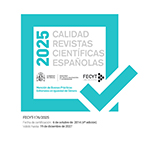Alfabetización mediática en la escuela primaria. Estudio de caso en Galicia
Resumen
Las nuevas necesidades formativas para una integración activa y crítica de los ciudadanos en el Siglo XXI han generado disposiciones curriculares que integran la llamada Competencia Digital (CD). En este artículo se presenta una investigación que propone describir, conocer y comprender los procesos de apropiación e interpretación de las propuestas curriculares referidas a la competencia digital en las escuelas primarias de Galicia. Las preguntas de investigación refieren a: ¿Cómo traduce el profesorado las disposiciones curriculares en sus prácticas de aula? ¿Qué estrategias de enseñanza con nuevos medios se están llevando a cabo en las aulas para contribuir al desarrollo de la competencia mediática? Se realizó un diseño cualitativo basado en estudio de caso con enfoque etnográfico, con observación participante, entrevistas, grupos de discusión y análisis documental. Los datos fueron analizados utilizando Atlas.ti 7 en base a la teoría fundamentada. Los resultados evidencian la creación de espacios para trabajar los medios en la escuela, aunque su tratamiento es escaso, con poca profundidad y deja de lado aspectos esenciales de la competencia digital, como el análisis crítico de la información. La escuela aparece como un lugar esencial desde el que abordar los aprendizajes relacionados con esta competencia para garantizar la justicia social en la sociedad contemporánea, donde la participación del alumno y su rol activo es fundamental para desarrollar las dimensiones de comunicación y creación de contenidos de la competencia digital.
Descargas
Descarga artículo
Licencia
La Revista Complutense de Educación, para fomentar el intercambio global del conocimiento, facilita el acceso sin restricciones a sus contenidos desde el momento de su publicación en la presente edición electrónica, y por eso es una revista de acceso abierto. Los originales publicados en esta revista son propiedad de la Universidad Complutense de Madrid y es obligatorio citar su procedencia en cualquier reproducción total o parcial. Todos los contenidos se distribuyen bajo una licencia de uso y distribución Creative Commons Reconocimiento 4.0 (CC BY 4.0). Esta circunstancia ha de hacerse constar expresamente de esta forma cuando sea necesario. Puede consultar la versión informativa y el texto legal de la licencia.











